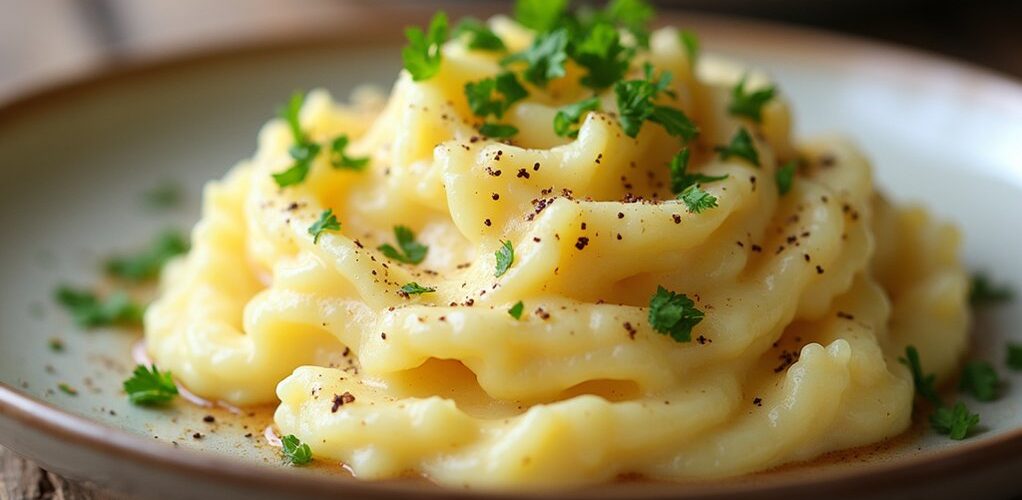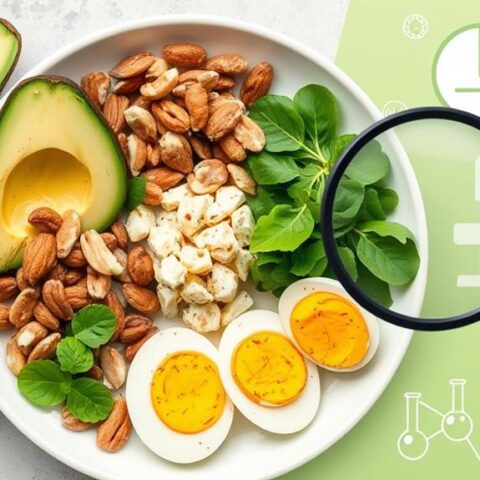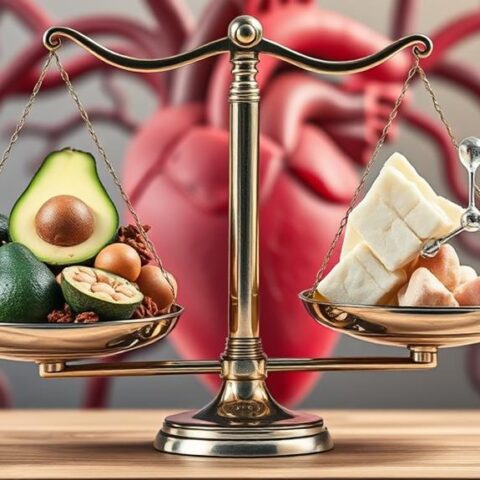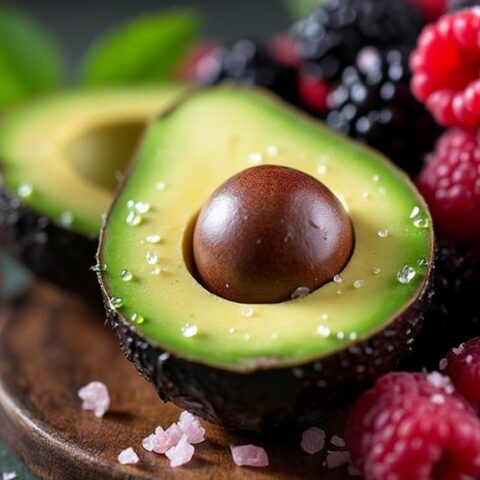
Traditional mashed potatoes are not low-carb, containing approximately 36 grams of carbohydrates per serving, along with 150-195 calories. While they provide essential nutrients like potassium and vitamin C, their high carbohydrate content makes them unsuitable for low-carb dietary plans. Alternatives like cauliflower mash offer similar comfort food experiences with only 5 grams of carbohydrates per serving. Understanding ingredient modifications and cooking techniques can transform this classic dish into a healthier option.
Key Takeaways
- Traditional mashed potatoes contain 36 grams of carbohydrates per serving, making them unsuitable for low-carb diets.
- Cauliflower mash is a popular low-carb alternative, containing only 5 grams of carbohydrates per serving.
- A half-cup serving of regular mashed potatoes contains 150-195 calories and significant sodium content.
- Low-carb alternatives include rutabaga puree and Greek yogurt-based mashes that maintain comfort food appeal.
- Adding potato skins increases fiber content but doesn't significantly reduce the high carbohydrate content of mashed potatoes.
Understanding Carbohydrates in Mashed Potatoes
While mashed potatoes remain a beloved comfort food, their carbohydrate content requires careful consideration for those monitoring their dietary intake. A typical serving contains approximately 36 grams of carbohydrates, making traditional mashed potatoes incompatible with low-carb dietary plans.
Mashed potatoes may comfort the soul, but their high carbohydrate content poses challenges for those mindful of their dietary choices.
The type of potato selected influences the overall carbohydrate content, with Yukon Gold varieties containing slightly more carbohydrates than Russet potatoes.
For those seeking to reduce their carbohydrate intake while still enjoying similar textures and flavors, alternatives like mashed cauliflower offer a viable solution, containing only 5 grams of carbohydrates per serving.
These substitutions can help maintain the comfort food experience while aligning with stricter dietary requirements, particularly for individuals following low-carb eating plans or managing blood sugar levels.
The Nutritional Profile of Traditional Mashed Potatoes
Although traditional mashed potatoes offer a comforting and satisfying dish, their nutritional profile reveals significant caloric and sodium content that merits careful consideration.
A typical half-cup serving of mashed potatoes contains approximately 150 calories and up to 600 milligrams of sodium when seasoned. The addition of traditional ingredients like butter and cream can contribute up to 10 grams of fat per serving, while the dish provides minimal fiber content at around 4 grams, particularly when prepared without potato skins.
When examining the complete nutritional makeup, traditional mashed potatoes contain substantial carbohydrates at 36 grams per serving, making them a calorie-dense option that may require portion control for those monitoring their daily nutritional intake.
Health Benefits and Drawbacks
While mashed potatoes offer considerable nutritional benefits through their potassium and vitamin C content, their high carbohydrate content presents challenges for those following restricted diets. The traditional preparation methods often incorporate high-calorie ingredients like butter and cream, which can impact weight management goals and blood sugar levels. For individuals seeking lower-carb alternatives, cauliflower mash provides a viable substitute that maintains the comfort food experience while reducing carbohydrate intake considerably. Additionally, exploring low-carb pasta alternatives such as Shirataki noodles or zucchini noodles can further diversify meal options for those adhering to low-carb diets.
Nutritional Value Analysis
The nutritional profile of mashed potatoes presents a complex balance of health benefits and potential drawbacks for consumers. While they provide essential nutrients like potassium for cardiovascular health, their high carbohydrate content and caloric density require careful portion control, particularly for those monitoring their weight or blood sugar levels.
| Nutrient Component | Amount per Serving |
|---|---|
| Calories | 150 |
| Carbohydrates | 36g |
| Potassium | 620mg |
| Fiber (with skin) | 3g |
| Fat (varies) | 4-8g |
Understanding these nutritional values helps consumers make informed decisions about incorporating mashed potatoes into their diet. The preparation method considerably impacts the overall nutritional profile, with skin-on preparations offering increased fiber benefits, while additions like butter and cream can greatly increase the caloric and fat content.
Low-Carb Alternative Options
As dietary preferences and health needs evolve, many people seek alternatives to traditional mashed potatoes that align with low-carbohydrate lifestyles. Several low-carb alternatives can effectively recreate the comfort food experience while maintaining nutritional goals.
These substitutes not only reduce carbohydrate intake but can also introduce additional nutrients to the diet.
Consider these popular mashed potato alternatives:
- Cauliflower mash, offering only 5 grams of carbs per cup
- Rutabaga puree, providing a similar texture to potatoes
- Cottage cheese blend, adding protein and creaminess
- Greek yogurt-based mash, delivering protein while maintaining texture
While these alternatives considerably reduce carbohydrate content, consumers should remain mindful of potential nutrient gaps and carefully monitor added fats and sodium to maintain the health benefits of their low-carb choices.
Low-Carb Alternatives to Classic Mashed Potatoes
For health-conscious individuals seeking to reduce their carbohydrate intake, several alternatives to traditional mashed potatoes offer similar comfort-food satisfaction with considerably fewer carbs. While classic mashed potatoes contain approximately 36 grams of carbohydrates per serving, low-carb alternatives provide significant reductions in carb content while maintaining appealing taste and texture. Cauliflower mash emerges as a leading substitute, containing only 5 grams of carbs per serving, while rutabaga and turnip mashes offer slightly higher but still modest carb counts of 8 and 6 grams, respectively. Zucchini mash presents another viable option at just 4 grams of carbs per serving. These alternatives can be enhanced with heavy cream and seasonings to achieve a creamy, satisfying consistency comparable to traditional mashed potatoes. For those following a keto diet, incorporating dairy products like cheddar cheese can further enrich the flavor while keeping the dish low in carbs.
Making Healthier Mashed Potato Choices
While traditional mashed potatoes remain a beloved comfort food, health-conscious individuals can make smarter choices to reduce calories and carbohydrates without sacrificing flavor.
Making healthier mashed potato choices involves selecting alternative ingredients and practicing mindful portion control.
When preparing a healthier version, consider these key modifications:
- Substitute traditional potatoes with cauliflower or rutabaga.
- Replace heavy cream with low-fat dairy options like Greek yogurt.
- Enhance flavor with fresh herbs and spices instead of excess butter.
- Control portions to maintain appropriate carbohydrate intake.
These adaptations can considerably reduce the carbohydrate content while maintaining the creamy, satisfying texture that makes mashed potatoes so appealing.
Impact on Blood Sugar Levels
Understanding the impact of mashed potatoes on blood sugar levels proves vital for individuals monitoring their glycemic response. With approximately 36 grams of carbohydrates per serving, mashed potatoes can cause significant spikes in blood sugar, as their glycemic index ranges from 70 to 90, depending on preparation methods. For those managing diabetes or insulin resistance, the high carbohydrate content presents a particular concern. While adding ingredients like butter or cream may slightly modify the glycemic response, the fundamental carbohydrate load remains substantial. Health-conscious individuals seeking alternatives might consider cauliflower mash, which provides a similar texture and comfort food experience while maintaining better blood sugar control. When consuming traditional mashed potatoes, careful portion control becomes important to minimize dramatic fluctuations in blood glucose levels. Incorporating non-starchy vegetables is beneficial in managing blood sugar levels effectively, as they contribute to a more balanced glycemic response compared to starchy foods.
Portion Control and Serving Sizes
Mastering portion control presents an imperative element in enjoying mashed potatoes while maintaining dietary balance. A standard serving size of one-half cup contains 195 calories and 34 grams of carbohydrates, making careful measurement vital for managing nutritional intake.
To visualize appropriate serving sizes for mashed potatoes, consider these common comparisons:
- Half-cup serving equals the size of a tennis ball
- One-third cup portion resembles a computer mouse
- Quarter-cup serving matches a large egg
- Two tablespoons approximates a golf ball
Understanding these portion guidelines helps individuals make informed decisions about their mashed potato consumption.
Those following low-carb diets may opt for smaller portions or consider alternatives like cauliflower mash, which provides similar texture with noticeably fewer carbohydrates per serving.
Recipe Modifications for Lower Carbs
Traditional mashed potato recipes can be transformed into lower-carb versions through strategic ingredient substitutions, with cauliflower serving as an excellent potato replacement that maintains the classic creamy texture.
Incorporating healthy fats like olive oil or avocado can enhance both flavor and nutritional value while keeping the dish satisfying and diet-friendly.
The reduction of conventional dairy ingredients, such as heavy cream and butter, in favor of alternatives like Greek yogurt or cottage cheese, helps maintain the desired consistency while considerably lowering the overall carbohydrate content.
Additionally, using unsweetened plant-based milk, such as almond milk, can further reduce carbs while adding a creamy texture to the dish.
Substitute Cauliflower For Potatoes
For health-conscious individuals seeking to reduce their carbohydrate intake while still enjoying the comfort of mashed potatoes, cauliflower presents an excellent alternative that cuts carbs by more than 85 percent per serving.
This versatile vegetable delivers a mere 5 grams of carbs per cup compared to potato's 36 grams, while providing a similar creamy texture when properly prepared.
To achieve the perfect potato-like consistency, follow these essential steps:
- Steam or blanch cauliflower florets until tender
- Process in a food processor until smooth
- Incorporate cream cheese or cottage cheese for enhanced creaminess
- Season generously with garlic, herbs, and spices to mask residual cauliflower taste
At just 25 calories per serving, this modification allows dieters to indulge in a familiar comfort food while maintaining their nutritional goals.
Add Healthy Fat Sources
While cauliflower offers an excellent low-carb base, incorporating healthy fats into mashed potato alternatives can greatly enhance both nutritional value and satisfaction.
Olive oil stands out as a particularly beneficial addition, providing heart-healthy monounsaturated fats while creating a smooth, creamy texture. These healthy fat sources can effectively replace traditional butter and cream without compromising the comfort food experience.
Food enthusiasts can also experiment with other nutritious fats like avocado, which adds richness while keeping carbohydrates low.
When combined with seasonings and herbs, these healthy fats help carry flavors throughout the dish, ensuring each bite remains satisfying. This approach not only reduces the overall carbohydrate content but also introduces beneficial nutrients that support a balanced, health-conscious diet.
Reduce Dairy Ingredients
Making dairy-free modifications to mashed potato recipes can greatly reduce their carbohydrate content without sacrificing the creamy texture that makes this comfort food so appealing.
To reduce dairy ingredients while maintaining the desired consistency, several effective alternatives can be incorporated into traditional recipes.
- Replace heavy cream with unsweetened almond milk or vegetable broth for a lighter, yet still creamy mashed consistency.
- Substitute Greek yogurt for sour cream to add protein while maintaining richness.
- Use olive oil instead of butter to incorporate healthy fats and enhance flavor.
- Incorporate herbs and spices like garlic, rosemary, and black pepper to boost taste without relying on dairy products.
These modifications create a satisfying dish that retains the comfort food appeal while offering healthier nutritional benefits.
Best Potato Varieties for Reduced Carb Content
Individuals following a reduced-carb lifestyle can still enjoy mashed potatoes by selecting specific varieties or alternative vegetables that offer lower carbohydrate content. While Yukon Gold potatoes contain 36 grams of carbs per medium potato, red potatoes provide a slightly better option at 26 grams, making them a smarter choice for moderate carb reduction.
| Variety | Carbs (g) | Best Use |
|---|---|---|
| Russet | 37 | Traditional mash |
| Red | 26 | Light mashing |
| Rutabaga | 8 | Low-carb alternative |
For those requiring significant carb reduction, rutabaga emerges as the superior choice, containing just 8 grams of carbohydrates per 100 grams while maintaining a creamy consistency similar to traditional mashed potatoes.
Storage and Reheating Guidelines
Proper storage and reheating techniques can considerably extend the lifespan of leftover mashed potatoes while maintaining their original texture and flavor.
Home cooks should store their mashed potatoes in airtight containers, keeping them refrigerated for up to five days or frozen for up to two months.
When it's time to serve, gentle reheating methods combined with a splash of milk or broth will restore the potatoes to their original creamy consistency.
Proper Storage Methods
A bowl of perfectly preserved mashed potatoes depends on following essential storage and reheating guidelines to maintain their creamy texture and delicious flavor.
Leftover mashed potatoes should be transferred to an airtight container and refrigerated promptly after cooling to room temperature. For best results, avoid metal containers which can affect taste and consistency.
- Store refrigerated mashed potatoes for 3-5 days maximum
- Freeze cooled potatoes in shallow containers for up to 2 months
- Reheat gently in 30-second microwave intervals
- Add milk or broth during reheating if consistency is too thick
These storage methods guarantee your mashed potatoes retain their original quality while preventing texture degradation and maintaining food safety standards throughout their shelf life.
Reheating For Best Results
Successfully reheating mashed potatoes requires careful attention to maintain their original creamy texture and prevent them from becoming dry or gummy.
When stored properly in an airtight container in the refrigerator, these comfort-food staples remain fresh for 3-5 days, while freezer storage extends their life up to 2 months.
For ideal reheating results, warm the potatoes gradually using 30-second intervals in the microwave or gentle heat on the stovetop.
If the consistency becomes too thick during reheating, adding a small amount of milk or broth can restore the desired creaminess.
Remember to taste and adjust seasonings afterward, as flavors may have diminished during storage.
This method guarantees the potatoes retain their comforting appeal and satisfying texture through the reheating process.
Pairing Suggestions for Balanced Meals
Creating balanced meals with mashed potatoes involves strategically pairing this beloved comfort food with nutritious companions that enhance both flavor and health benefits.
By incorporating fresh herbs and thoughtfully selected ingredients, these pairings can transform a simple side dish into a cornerstone of balanced meals.
For ideal nutrition and satisfaction, consider these wholesome combinations:
- Lean grilled chicken breast with rosemary-infused mashed potatoes and steamed broccoli
- Roasted turkey cutlets alongside garlic mashed potatoes and sautéed spinach
- Pan-seared fish with olive oil-drizzled mashed potatoes and roasted green beans
- Lentil stew served over herb-seasoned mashed potatoes with caramelized onions
These pairings guarantee a good balance of proteins, vegetables, and healthy fats while maintaining the comforting appeal of mashed potatoes.
Special Dietary Considerations
Managing dietary restrictions while enjoying mashed potatoes requires careful consideration of ingredients and preparation methods. For those following low-carb diets, traditional mashed potatoes present a challenge with their high carbohydrate content of approximately 36 grams per serving.
Traditional mashed potatoes can challenge low-carb dieters, containing 36 grams of carbohydrates per serving and requiring thoughtful ingredient selection.
Several strategies can help accommodate dietary needs while preserving the comfort food experience. Incorporating low-carb alternatives like cauliflower or rutabaga can markedly reduce carbohydrate content while maintaining familiar textures. Adding high-fiber ingredients, such as potato skins or leafy greens, helps improve nutritional value and lower net carbs. For those following ketogenic diets, enhancing flavor with heavy cream, butter, and cheese provides satisfaction without compromising carb restrictions. Including non-starchy vegetables in your diet, such as broccoli or spinach, can further support nutrient intake while adhering to keto guidelines. Additionally, controlling portion sizes allows individuals to enjoy this classic dish while staying within their dietary parameters.
Frequently Asked Questions
Is Mashed Potato Good for a Low Carb Diet?
Mashed potatoes are not suitable for low-carb diets, containing 36 grams of carbs per serving. Nutrition facts suggest choosing low-carb alternatives like cauliflower or rutabaga mash instead.
Is Mashed Potatoes a Comfort Food?
Mashed potatoes are widely recognized as a classic comfort food. Their creamy texture, warm temperature, and rich flavor profile create a satisfying experience that provides emotional nourishment and feelings of contentment.
Are Mashed Potatoes Good or Bad Carbs?
Mashed potatoes contain high-glycemic carbs that rapidly raise blood sugar levels. While offering nutritional value through vitamins and minerals, their high carb content makes them less ideal for controlled-carbohydrate diets.
Is Potato Comfort Food?
Potatoes, especially when prepared with creamy texture, are widely recognized as comfort food, evoking culinary nostalgia through their warm, satisfying qualities and strong associations with family gatherings and cherished memories.
Conclusion
While traditional mashed potatoes remain a beloved comfort food, they are not considered low-carb due to their high starch content. However, health-conscious individuals can still enjoy this classic dish by exploring alternatives like cauliflower mash or incorporating lighter potato varieties. By making mindful modifications to ingredients and portions, or choosing low-carb substitutes, people can maintain their dietary goals while satisfying their craving for this timeless side dish.








No Comments